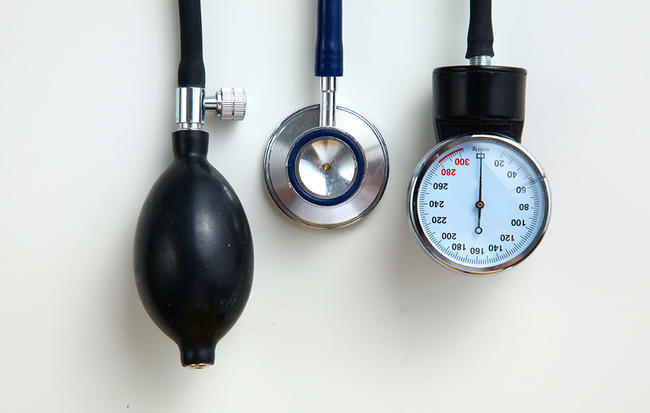There are some things that are hard to commit to memory: your mother-in-law’s birthday, how much milk is left in the fridge, and your last blood pressure reading, to name a few.
But over half of all Americans will experience high blood pressure, according to the American Heart Association. And considering that high blood pressure essentially doubles your risk of cardiovascular disease, you might want to memorize your next BP reading, says Paul K. Whelton, M.D., lead author of the American College of Cardiology’s guidelines on blood pressure.
High blood pressure means that your blood is pressing against your blood vessels harder than it should. Sounds innocuous, but over time, that can damage the vessel walls and allow plaque buildup to form, blocking arteries and depriving the body of the blood and oxygen it needs, says Amber Khanna, M.D., a cardiologist at UCHealth University of Colorado Hospital.
Now the big question is: How do you know if you have high blood pressure (especially if you have no clue what your numbers look like)? Chances are, you won’t have a clue. While high blood pressure can lead to serious or fatal outcomes like heart attacks and stroke, it’s almost entirely symptomless, earning its name as “the silent killer.” And the claims that high blood pressure symptoms include nosebleeds or a red face or somehow just “feeling” the extra pressure? That’s all completely false, according to the AHA.
Undetected high blood pressure is even riskier for women because many patients and doctors still think of it as a “man’s problem,” Khanna says. “Women are just as likely to have high blood pressure as men, but they’re much less likely to be diagnosed with it and less likely to be treated appropriately for it,” she says.
To make sure this doesn’t happen to you, we’ve asked doctors to share a few things you can look for now to help you understand your own risk of high blood pressure and when you need to seek treatment.

1 YOUR NUMBERS ARE OVER 130/80
Obviously, a high blood pressure reading is like, “duh, you have high blood pressure.” But most women don’t know theirs, for which there’s no excuse, says Adam Splaver, M.D., a cardiologist at Nanohealth Associates in Hollywood, Florida. “Just because you don’t look, doesn’t mean its not there,” he says, adding that unlike an x-ray or blood test, this is one routine medical test you can—and should—do yourself.
Nearly every pharmacy and drug store has a free in-store blood pressure machine or you can purchase your own portable blood pressure monitor for less than $30, Khanna says, noting that both methods are very accurate and similar to what you’d get in a doctor’s office.
Your blood pressure changes constantly to adjust to your activity level, hydration, sleep, food intake and other factors, so to get an accurate picture of your blood pressure you need to get several readings over time. Pick a time when you’re calm and well-hydrated, take your blood pressure, and then repeat the test weekly or monthly under the same conditions, she says. Write down the dates and your numbers and take those with you to your next doctor’s visit.
Any more than three readings in a row over 130/80 warrant a call to your doctor. According to the American College of Cardiology’s blood pressure guidelines, normal is less than 120/80 mm Hg, elevated is 120-129/80, stage 1 hypertension is 130-139/80-89, stage 2 hypertension is at least 140/90, and a hypertensive crisis anything over 180/120.

2 YOUR MOM OR DAD HAVE HIGH BLOOD PRESSURE
While exercise and healthy eating go a long way toward lowering blood pressure, you can’t discount the role genetics play. Genetics are a major factor when it comes to your heart health and high blood pressure can be hereditary, Khanna says. So ask your family members today about their history of high blood pressure or heart disease.
The people you should be most concerned about are your parents, grandparents, and siblings—especially if any of them had a heart attack younger than 45 years old, she adds.

3 YOU’RE DEALING WITH BRAIN FOG OR HEADACHES
Some people with high blood pressure may experience mild, chronic headaches and/or brain fog, Splaver says. However, these high blood pressure symptoms usually don’t manifest in a noticeable way until your blood pressure is really high.
If you ever get a crushing headache that just won’t quit, with or without a nosebleed, you may be having a “hypertensive crisis” and you need to go the ER immediately.

4 YOU’RE BLOATED AND NOT MUCH IS COMING OUT IN THE BATHROOM
High blood pressure is often closely linked with diabetes and kidney disease, so some women may experience bloating and decreased urination as a side effect, Khanna says. In fact, she says many people first discover they have high blood pressure because their kidneys and potty habits go amok.
So pay attention to what urinary habits are normal for you, and make a note if that changes.

5 YOUR VISION HAS SUDDENLY GOTTEN A LOT WORSE
High blood pressure can affect the blood vessels in your eyes, causing them to swell, Khanna says. This can sometimes be identified during a routine eye exam, although this too is a later symptom of high blood pressure, she adds.
If you experience blurry vision or a sudden change in vision, make an appointment to see your doctor right away.

6 YOU’RE DIZZY OR HAVE TROUBLE KEEPING YOUR BALANCE
Suddenly feeling dizzy and losing your balance can be an early warning sign of a stroke caused by high blood pressure.
If the dizziness is linked to something obvious, like standing up too fast or watching a 3D movie, or if it passes quickly, it’s probably nothing to worry about. But if it keeps going, this is one symptom you shouldn’t ignore, the AHA says. Call your doctor ASAP.












